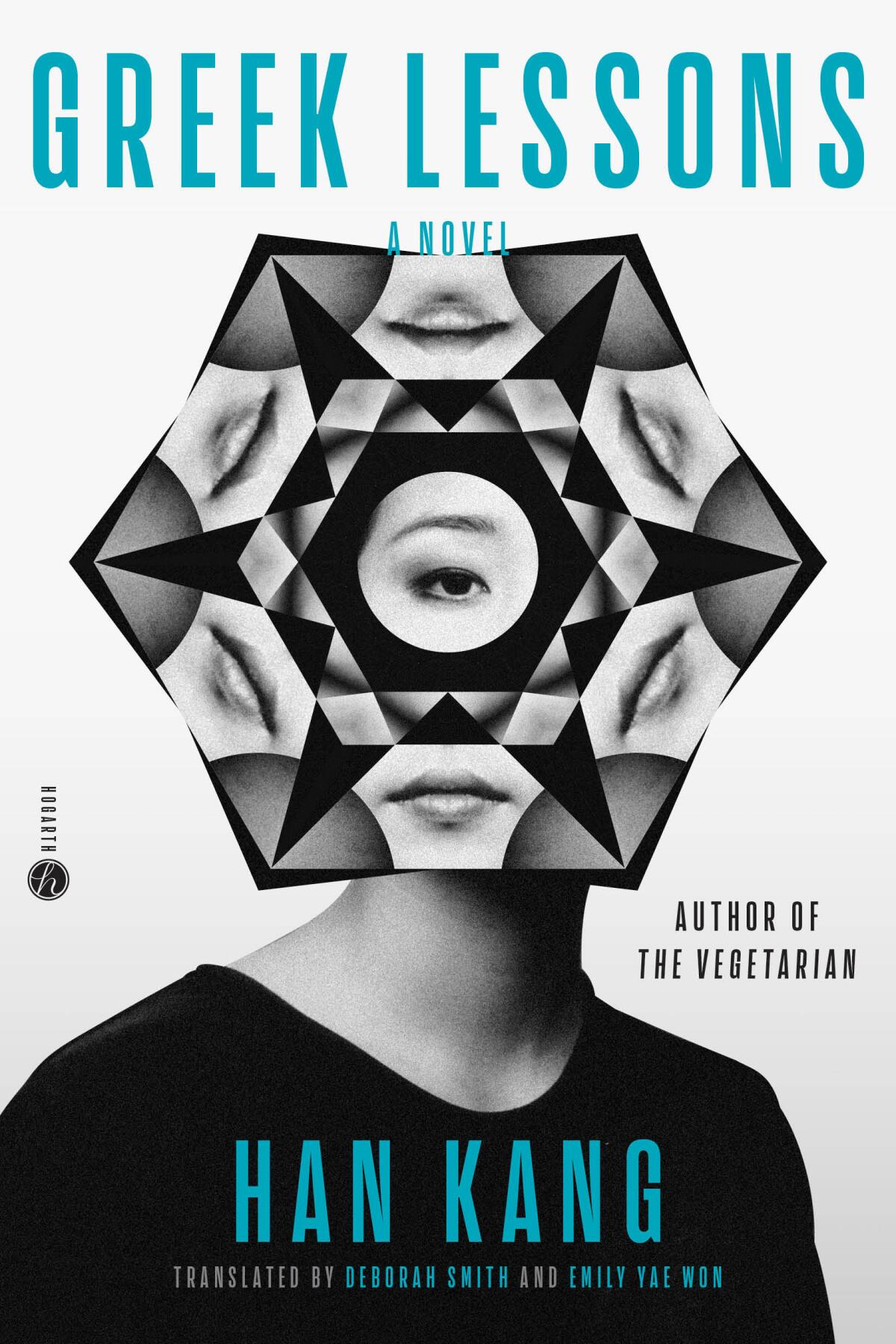Why ‘The Vegetarian’ author Han Kang’s newly translated novel is her gutsiest yet

- Share via
Review
Greek Lessons
By Han Kang
Translated by Deborah Smith and Emily Yae Won
Hogarth: 192 pages, $26
If you buy books linked on our site, The Times may earn a commission from Bookshop.org, whose fees support independent bookstores.
How strange it is to be human. Plenty of authors have written about this peculiarity (some better than others), but Han Kang turns the well-worn idea of the mind-body disconnect into something fresh and substantial. The scarred strangers in “Greek Lessons,” Kang’s fourth novel to be translated into English from Korean, move from isolation to connection with their bodies and with one another.
The inherent difficulty of a dead language draws a teacher and student — both unnamed — to the same classroom in Seoul, although for different reasons. The teacher, nearing 40, grew up in Korea and Germany, split between two languages and cultures, but finds himself riveted by ancient Greek: “Its complicated grammatical system — and the fact that it was a long-dead language — meant Greek felt to me like a safe, quiet room.” He finds comfort in it even as his life grows more challenging; his eyesight has been slowly fading for decades.
One of his students, a poet and mother and grieving daughter, is losing her power of speech. She signed up for his course “because she wants to reclaim language of her own volition,” having grown mute after her mother died and she lost custody of her 8-year-old son — but as she herself reflects, the cause “couldn’t be that simple.” The teacher’s perspective is narrated from the first person, while the student’s is third-person. To speak from her own point of view seems impossible, because to do so would take up space, something she’s always made a point of avoiding. “She had no wish to disseminate her self.”
South Korea is such a prosperous democratic republic that it’s easy to forget that the country was under military dictatorship as recently as 1987.
This isn’t the first time she has been at a loss for words; 20 years earlier, at 16, “the language that had pricked and confined her like clothing made from a thousand needles abruptly disappeared.”
The discomforts of inhabiting a body can be as challenging to translate as ancient Greek, but Kang is fluent in the intricacies of self-estrangement. Her growing English-language audience will find the themes of “Greek Lessons” — disembodiment and grief — familiar from her earlier novels, including “Human Acts” and her breakthrough, “The Vegetarian,” which won a Booker International Prize (with a translation that caused some controversy).

In this novel, the disappearance of the student’s voice muddles her perception of her own body. “Sometimes she thinks of herself as more like some form of substance, a moving solid or liquid, than like a person,” Kang writes in a passage that calls to mind “The Vegetarian.” “When she eats hot rice, she feels that she herself becomes that rice, and when she washes her face with cold water there is no distinction between her and that water. At the same time she knows that she is neither rice nor water, but some harsh, solid substance that will never commingle with any being, living or otherwise.”
Her alienated perspective can be relentless at times, like a recurring nightmare in which you keep walking down the same narrow hallways, retracing your steps and making no progress. The student built her life around language only to have what gave her meaning taken away, along with the people who mattered to her most. “Words and sentences track her like ghosts, at a remove from her body, but near enough to be within ear- and eyeshot.”
The teacher empathizes, having fallen in love as a teenager with a deaf girl. But there’s an impermeability to this woman’s demeanor that’s different. “I’d never seen such silence in someone who was alive,” he reflects.
Before publishing his famous Chinese poetry translation “Cathay” in 1915, Ezra Pound apparently had no knowledge of Chinese at all.
In an interview with the New Yorker, Kang shared the first moment of inspiration for “Greek Lessons”: A publisher told her that in ancient Greek “a single word can contain multilayered meanings, citing the middle voice, a grammatical structure that doesn’t exist in Korean, which instantly attracted me.”
The possibility of winnowing the bulkiness of language down to a single word, and all that word can signify, is relevant for the protagonists — both the teacher, replaying memories of people from his past, and the student, stuck on the threshold between thought and expression.
“Each time she tried to begin a sentence, she could feel her aged heart,” Kang writes. “Her patched and repatched, dried-up, expressionless heart. The more keenly she felt it, the more fiercely she clasped the words. Until all at once, her grip slackened. The dulled fragments dropped to her feet. The saw-toothed cogs stopped turning.”
“Greek Lessons” is concerned with how people can communicate when options are taken away from them, and how vulnerability can open the door. The most moving part of the book revolves around a moment of crisis for the teacher, when he must depend on the student. She traces words on his palm with her fingertip, finding her way back to her voice through physical touch.
Your ultimate L.A. Bookhelf is here — a guide to the 110 essential L.A. books, plus essays, supporting quotes and a ranked list of the best of the best.
Kang’s latest isn’t a page-turner, and reading it can feel like being suspended in time, or sitting through a very long class, despite the book’s slimness. But that’s the effect of writing into discomfort. It’s important for the reader to feel it in their own body, a reminder that language is connected to the corporeal. Halfway through the book, she writes that the loss of words makes the world “fragmented, each piece distinct and separate — like the colored paper inside the kaleidoscope, shifting silently, repeatedly and in concert to form new patterns.” A distorted or disrupted perspective is the only path to clarity for her characters. In “Greek Lessons” Kang reaches beyond the usual senses to translate the unspeakable.
Filgate is a writer and the editor of the anthology “What My Mother and I Don’t Talk About.”








